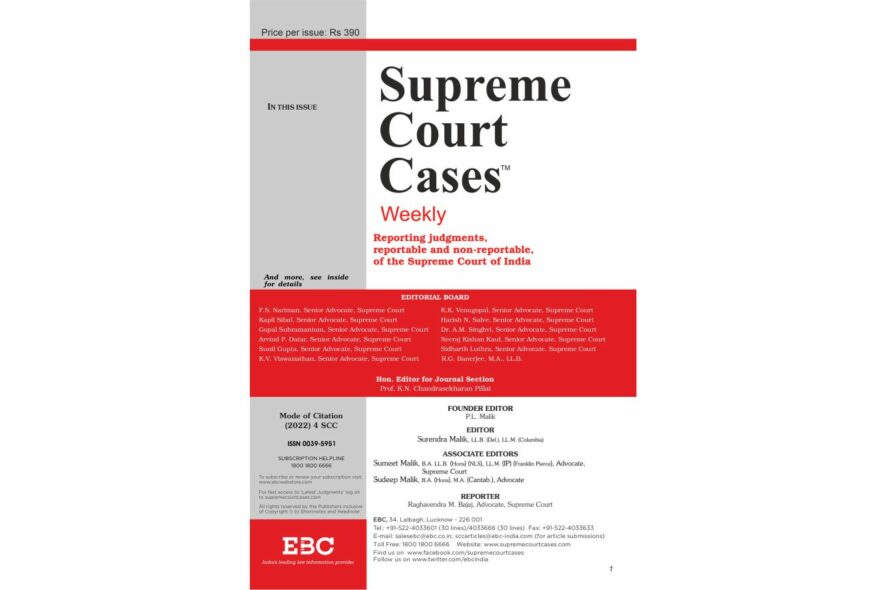2022 SCC Volume 4 Part 3, consists a very pertinent decision of the Supreme Court wherein it was held that it cannot be said that the Tribunal will have jurisdiction only if the subject property is disputed to be a waqf property and not if it is admitted to be a waqf property as such interpretation will be against the provisions Section 83(1) of Act.Read the detailed Judgemnt here: Rashid Wali Beg v. Farid Pindari, (2022) 4 SCC 414]
Short Notes: 3
Arbitration and Conciliation Act, 1996 — Ss. 34 and 5: Award on issues/matters beyond the scope of the arbitration clause which was invoked, as the issues/matters in question pertained to another distinct agreement, arbitration clause in which latter agreement was not invoked, is not valid. Award on lease rental and lease duration i.e pertaining to lease agreement is not permissible, when arbitration has been invoked under dealership agreement. [Indian Oil Corpn. Ltd. v. Shree Ganesh Petroleum, (2022) 4 SCC 463]
Central Goods and Services Tax Act, 2017 — Ss. 39, 16, 49(2) and 59 — Circular No. 26/26/2017-GST dt. 29-12-2017: Rectification of return, on the premise of Form GSTR-2A being non-operational at the relevant time is not permissible. [Union of India v. Bharti Airtel Ltd., (2022) 4 SCC 328]
Criminal Procedure Code, 1973 — S. 482 — Prayer for directions for conduct of impartial investigation: Interim order(s) cannot be passed by High Court, particularly without hearing the affected part(ies). [OLX India B.V. v. State of Haryana, (2022) 4 SCC 390]
Evidence Act, 1872 — Ss. 65-A and 65-B: Copies of electronic evidence are sufficient when duly certified as per S. 65-B. The fact that original electronic evidence was one of the exhibits of the evidence on record, but not played in court, and only the certified copies thereof were played in court, is of no effect. [Taqdir v. State of Haryana, (2022) 4 SCC 321]
Government Contracts and Tenders — Formation of Government Contract — Enlistment/Blacklisting/Downgrading of Contractor/Tenderer — Blacklisting/Debarment: Period of blacklisting, further held, has to be proportionate to nature of offence(s) committed by erring contractor. Tentative decision to blacklist erring suppliers/contractors taken after assessing available materials prior to issuance of show-cause notice cannot be treated as pre-determined decision. Order of blacklisting passed after providing opportunity of hearing thereafter, held, cannot be called as violating principles of natural justice. [State of Odisha v. Panda Infraproject Ltd., (2022) 4 SCC 393]
Service Law — Dismissal/Discharge — Grounds for dismissal/discharge — Dismissal — Proportionality: As allegations of fraud committed by employee concerned on employer Bank were fully established, superannuation of employee concerned in the meantime is not relevant. [United Bank of India v. Bachan Prasad Lall, (2022) 4 SCC 358]
Service Law — Penalty/Punishment — Proportionality/Quantum of punishment: Substitution of punishment of removal with compulsory retirement, when warranted, explained. [Umesh Kumar Pahwa v. Uttarakhand Gramin Bank, (2022) 4 SCC 385]
Service Law — Pension — Entitlement to pension — Vested/accrued rights — Divesting of vested/accrued rights with retrospective effect — Permissibility: Amendment having retrospective operation divesting employee of benefit already granted to him under existing Rules, violative of Arts. 14 and 16 of the Constitution. Employees who had opted for Pension Scheme had vested/accrued rights and any amendment to contrary made with retrospective effect taking away vested right accrued to employee under existing Rules was impermissible. Further held, non-availability of financial resources cannot be justification to take away vested right accrued to employees and that too which was for their socio-economic security. Pension is not a bounty and it is the duty of appellant to make funds available to protect vested rights of employees accrued in their favour. Punjab State Coop. [Agricultural Development Bank Ltd. v. Coop. Societies, (2022) 4 SCC 363]
Service Law — Pension — Qualifying period/service — Parity: Though it is settled law that the Rules applicable in matters of determination of pension are those which are in force at the time of retirement, but, held, that does not mean that employer can depart from this principle arbitrarily and confer benefit of Rules in force at the time of appointment, for computation of pension upon one employee and deny the same benefit to another employee who is similarly situated. [G. Sadasivan Nair v. Cochin University of Science & Technology, (2022) 4 SCC 404]
Wakf Act, 1995 — Ss. 85 and 83 (as amended by Amendment Act 27 of 2013) and Ss. 86 to 90, 93, 94(1), 4 to 7, 51 and 52 — Wakf Tribunal — Jurisdiction of Wakf Tribunal: Proper forum for suit for permanent injunction in respect of wakf property, and power to issue temporary injunctions and whether subject property is disputed to be wakf property, or, admitted to be wakf property, is Wakf Tribunal and not civil court. However, examination of remedies under the Wakf Act, 1995 indicates that jurisdiction of civil court is not totally excluded. The 1995 Act makes a specific reference to court/civil court also in certain places. Ss. 86, 90 and 93 make specific reference to “court”. S. 68(6) goes a step further by making a reference to “civil court”. Thus, on a cumulative reading of various provisions of the 1995 Act, held, bar of jurisdiction of civil court under the 1995 Act is not total and omnipotent and that there may be cases which may still be entertained by civil courts. Further held, question of bar of jurisdiction of the civil court, has been left for judicial determination. [Rashid Wali Beg v. Farid Pindari, (2022) 4 SCC 414]







